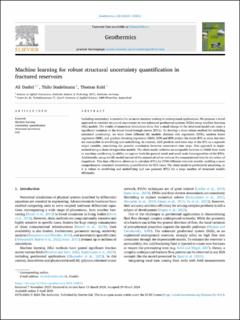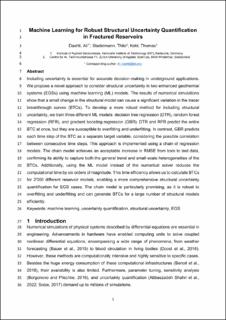Please use this identifier to cite or link to this item:
https://doi.org/10.21256/zhaw-30431Full metadata record
| DC Field | Value | Language |
|---|---|---|
| dc.contributor.author | Dashti, Ali | - |
| dc.contributor.author | Stadelmann, Thilo | - |
| dc.contributor.author | Kohl, Thomas | - |
| dc.date.accessioned | 2024-04-12T08:33:13Z | - |
| dc.date.available | 2024-04-12T08:33:13Z | - |
| dc.date.issued | 2024-06 | - |
| dc.identifier.issn | 0375-6505 | de_CH |
| dc.identifier.issn | 1879-3576 | de_CH |
| dc.identifier.uri | https://digitalcollection.zhaw.ch/handle/11475/30431 | - |
| dc.description.abstract | Including uncertainty is essential for accurate decision-making in underground applications. We propose a novel approach to consider structural uncertainty in two enhanced geothermal systems (EGSs) using machine learning (ML) models. The results of numerical simulations show that a small change in the structural model can cause a significant variation in the tracer breakthrough curves (BTCs). To develop a more robust method for including structural uncertainty, we train three different ML models: decision tree regression (DTR), random forest regression (RFR), and gradient boosting regression (GBR). DTR and RFR predict the entire BTC at once, but they are susceptible to overfitting and underfitting. In contrast, GBR predicts each time step of the BTC as a separate target variable, considering the possible correlation between consecutive time steps. This approach is implemented using a chain of regression models. The chain model achieves an acceptable increase in RMSE from train to test data, confirming its ability to capture both the general trend and small-scale heterogeneities of the BTCs. Additionally, using the ML model instead of the numerical solver reduces the computational time by six orders of magnitude. This time efficiency allows us to calculate BTCs for 2'000 different reservoir models, enabling a more comprehensive structural uncertainty quantification for EGS cases. The chain model is particularly promising, as it is robust to overfitting and underfitting and can generate BTCs for a large number of structural models efficiently. | de_CH |
| dc.language.iso | en | de_CH |
| dc.publisher | Elsevier | de_CH |
| dc.relation.ispartof | Geothermics | de_CH |
| dc.rights | https://creativecommons.org/licenses/by/4.0/ | de_CH |
| dc.subject | Machine learning | de_CH |
| dc.subject | Uncertainty quantification | de_CH |
| dc.subject | Structural uncertainty | de_CH |
| dc.subject | EGS | de_CH |
| dc.subject.ddc | 006: Spezielle Computerverfahren | de_CH |
| dc.title | Machine learning for robust structural uncertainty quantification in fractured reservoirs | de_CH |
| dc.type | Beitrag in wissenschaftlicher Zeitschrift | de_CH |
| dcterms.type | Text | de_CH |
| zhaw.departement | School of Engineering | de_CH |
| zhaw.organisationalunit | Centre for Artificial Intelligence (CAI) | de_CH |
| dc.identifier.doi | 10.1016/j.geothermics.2024.103012 | de_CH |
| dc.identifier.doi | 10.21256/zhaw-30431 | - |
| zhaw.funding.eu | No | de_CH |
| zhaw.issue | 103012 | de_CH |
| zhaw.originated.zhaw | Yes | de_CH |
| zhaw.publication.status | publishedVersion | de_CH |
| zhaw.volume | 120 | de_CH |
| zhaw.publication.review | Peer review (Publikation) | de_CH |
| zhaw.webfeed | Datalab | de_CH |
| zhaw.webfeed | Machine Perception and Cognition | de_CH |
| zhaw.webfeed | ZHAW digital | de_CH |
| zhaw.author.additional | No | de_CH |
| zhaw.display.portrait | Yes | de_CH |
| zhaw.relation.references | https://doi.org/10.5281/zenodo.10402387 | de_CH |
| Appears in collections: | Publikationen School of Engineering | |
Files in This Item:
| File | Description | Size | Format | |
|---|---|---|---|---|
| 2024_Dashti-etal_ML-for-robust-structural-uncertainty-quantification_VoR.pdf | Version of Record | 6.32 MB | Adobe PDF |  View/Open |
| 2024_Dashti-etal_ML-for-robust-structural-uncertainty-quantification_AAM.pdf | Accepted Version | 1.22 MB | Adobe PDF |  View/Open |
Show simple item record
Dashti, A., Stadelmann, T., & Kohl, T. (2024). Machine learning for robust structural uncertainty quantification in fractured reservoirs. Geothermics, 120(103012). https://doi.org/10.1016/j.geothermics.2024.103012
Dashti, A., Stadelmann, T. and Kohl, T. (2024) ‘Machine learning for robust structural uncertainty quantification in fractured reservoirs’, Geothermics, 120(103012). Available at: https://doi.org/10.1016/j.geothermics.2024.103012.
A. Dashti, T. Stadelmann, and T. Kohl, “Machine learning for robust structural uncertainty quantification in fractured reservoirs,” Geothermics, vol. 120, no. 103012, Jun. 2024, doi: 10.1016/j.geothermics.2024.103012.
DASHTI, Ali, Thilo STADELMANN und Thomas KOHL, 2024. Machine learning for robust structural uncertainty quantification in fractured reservoirs. Geothermics. Juni 2024. Bd. 120, Nr. 103012. DOI 10.1016/j.geothermics.2024.103012
Dashti, Ali, Thilo Stadelmann, and Thomas Kohl. 2024. “Machine Learning for Robust Structural Uncertainty Quantification in Fractured Reservoirs.” Geothermics 120 (103012). https://doi.org/10.1016/j.geothermics.2024.103012.
Dashti, Ali, et al. “Machine Learning for Robust Structural Uncertainty Quantification in Fractured Reservoirs.” Geothermics, vol. 120, no. 103012, June 2024, https://doi.org/10.1016/j.geothermics.2024.103012.
Items in DSpace are protected by copyright, with all rights reserved, unless otherwise indicated.